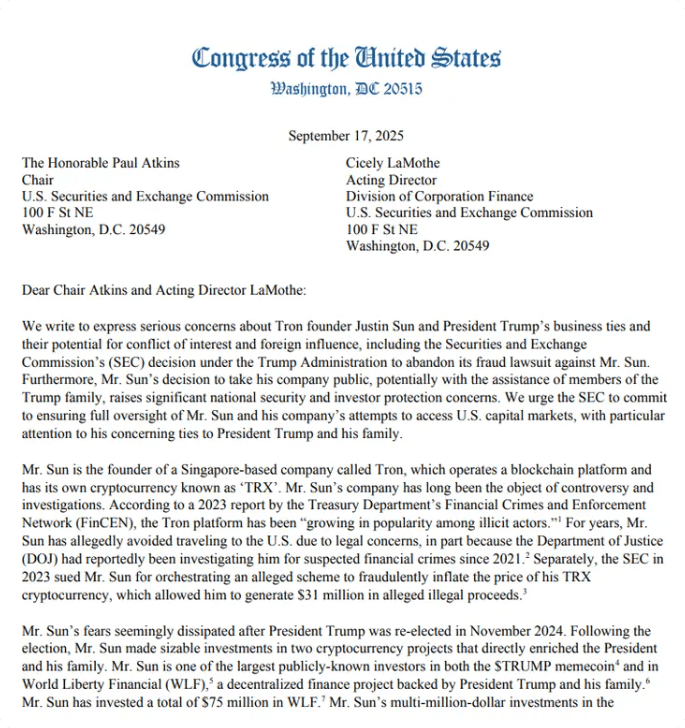U.S. lawmakers are increasing regulatory pressure on cryptocurrency mogul Sun Yuchen and his founded Tron, demanding that securities regulators undertake stricter scrutiny.
On September 17, U.S. Democratic Senator Jeff Merkley and Representative Sean Casten jointly wrote to SEC Chair Paul Atkins, sharply questioning the SEC and demanding explanations for the suspension of enforcement actions against Sun Yuchen and for Tron’s reverse merger to enter Nasdaq.
The congressman questioned in the letter why the SEC suddenly halted a lawsuit against Sun Yuchen for providing unregistered securities. The lawsuit was initially filed in 2023 but was requested to be paused in February of this year—just one month after former SEC Chair Gary Gensler left office.
They further suggested that Sun Yuchen had made 'huge investments' in cryptocurrency projects controlled by the Trump family (including World Liberty Financial and TRUMP coin), raising doubts about whether this background influenced the SEC's decisions and the 'fairness of regulation.'

Meanwhile, lawmakers have expressed serious concerns about the actions of TRON, which went public on NASDAQ through a 'reverse merger' in July this year, stating that this move 'could pose financial and national security risks.'
Reverse mergers are a legal way to bypass traditional IPOs, although they may circumvent some review processes.
They called on the SEC to conduct a comprehensive review of TRON's listing process to ensure it meets all stringent standards to maintain market transparency and protect investors' rights.
Sun Yuchen has been embroiled in controversy recently.
Not long ago, World Liberty Financial (WLFI), backed by the Trump family, blacklisted one of its wallet addresses and froze WLFI tokens worth over $100 million, citing detected irregular transfers.
Sun Yuchen responded on social media platform X, stating that the related operations were 'small tests' rather than sales, but this still failed to prevent significant market volatility and community speculation about his 'cash-out exit.'
This congressional inquiry occurs against the backdrop of a critical transformation in U.S. cryptocurrency regulation.
Since the Trump administration took office, the SEC has adjusted several policies under Chairman Atkins' leadership and has withdrawn enforcement actions against certain cryptocurrency companies.
At the same time, the CLARITY Act, promoted by House Republicans, aims to clarify the regulatory framework for digital assets and is currently awaiting review by the Senate Banking Committee, with formal legislation expected before 2026.
If passed, such legislation would reshape multiple regulatory standards, including listing rules, directly affecting the compliance prospects of companies like TRON.
